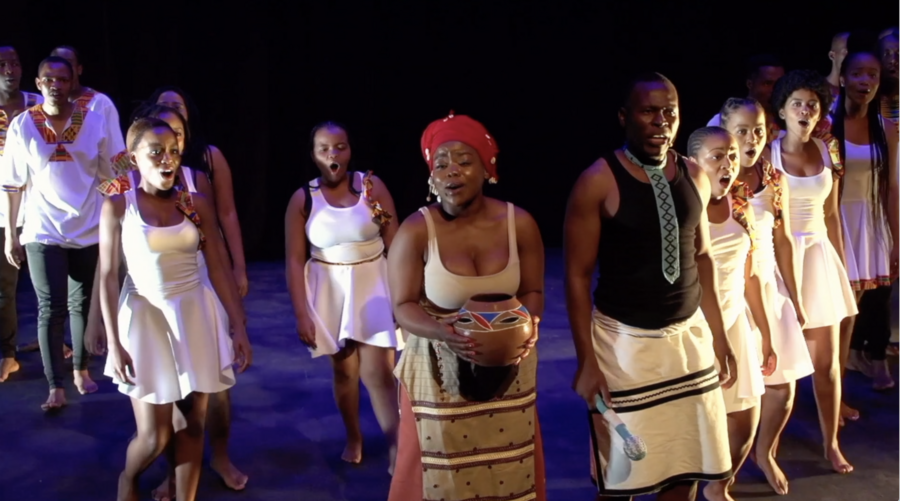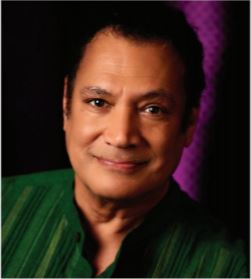Last February, just over a month before theatre closures swept the country, Theatre Communications Group (TCG) and many within the theatre community gathered for TCG’s 2020 Gala, an event that teased this year’s 60th anniversary year and planned gala. Despite the pandemic forcing this festive occasion to be held virtually, this year’s gala both reflected on the difficult year that was while dreaming of what is in store in the field’s future.
The pre-recorded ceremony opened with a reflection on the past year, with thoughts from TCG board president Nikkole Salter and executive director and CEO Teresa Eyring. “The theatremaking of the past may be just that: of the past,” said Salter, underscored by images of news coverage of the lockdowns, previous webinars and help sessions hosted by TCG, and a variety of American Theatre articles highlighting both the struggles and successes of a field faced with the twin viruses of COVID-19 and rampant racism. “It’s been a lot, and it’s not over,” added Eyring, looking toward the challenges that remain as theatres prepare to return to in-person programming.
After brief introductions from Eyring and TCG deputy director and COO Adrian Budhu (including a short hello from Budhu’s bowtie-wearing dog, Jack), in which both reflected on the hardships of the last year, TCG’s leaders turned their attention to the celebration at hand: TCG’s 60th Anniversary. When thinking about how TCG feels at 60, Eyring said “pretty damn good,” as TCG’s leaders emphasized the organization’s 500-plus member theatres and 8,000 individual members, as well as a strategic planning process that resulted in a new mission “to lead for a just and thriving theatre ecology.” Explained Eyring of the mission, “We do so believing that only by committing to systemic anti-racism can our field ever truly thrive.”
The evening’s host, Shequida, briefly introduced herself, stating that TCG is important to her because, as a young Black drag queen, she never saw anyone who looked like her as she was growing up studying opera. This gala, and her work on it with TCG, would be all about inclusion, she said. Following these brief remarks was a short introduction to the night’s first honoree, the Performing Arts Alliance (PAA). After highlighting PAA’s history and mission, the ceremony handed the mic to PAA board chair Michelle Ramos, who accepted the award on behalf of PAA.

“We envision a U.S. in which the diversity of performing arts is deeply valued, is adequately resourced, and is accessible to all,” said Ramos in her speech, emphasizing the collective nature of PAA’s work and lifting the individual organizations that comprise PAA’s board. After touching briefly on PAA’s advocacy efforts, Ramos explained PAA’s desire to continue to grow and deepen their work to become even more inclusive of organizations of all shape and size. “We ask you to please stay vigilant with the advocacy work,” Ramos concluded in her speech, asking viewers to take note of advocacy alerts and stay engaged in this type of work. “We can’t do this work without all of you.”
Following Ramos’s speech was a performance by the students of the Market Theatre Laboratory in Johannesburg, South Africa. The onstage performance was of a song titled “Camagu,” an IsiXhosa word meaning “to be honored” or “thank you.” The song venerated the lineage and legacy of African people, as 17 performers expressed gratitude through song and dance to their parents for their teachings, love, and respect.

Considering the long, meaningful relationship that has formed over the years between Market Theatre and New Jersey’s Crossroads Theatre Company, it felt all too appropriate to transition into honoring the gala’s second honoree of the night, Crossroads co-founder Ricardo Khan. Celebrating Khan’s legacy in the industry were numerous tributes, including thoughts from former Crossroads executive director Dick Nurse; Marshall Jones III, who has known Khan since Jones was in college at Rutgers; Trey Ellis, who wrote Fly and Kansas City Swing with Khan; and André De Shields, among others.
“He has this almost preternatural ability, as the greatest directors do, to go right to the center, to the heart of a work and bring it out to the people,” said playwright Murray Horwitz in a recorded statement. It was a sentiment echoed by Nikkole Salter, who talked about the way Khan is able to make people feel seen and heard. Added Ellis, “He really was the first person to see in me this other side, this playwriting side of me.”
Introduced by De Shields as “a great man of great service,” Khan took to the screen to accept his honor, but not before honoring others. He congratulated TCG for 60 years and tipped his hat to Marshall Jones III, who retired as the producing artistic director of Crossroads in 2019 and who was to direct Khan’s Freedom Rider before the pandemic cut rehearsals short. He also honored two pillars of Crossroads’ history who died last year: Dr. Cheryl Wall, the company’s first board president, and Crossroads co-founder Lee Kenneth Richardson.
“This was my call to go back to the community where we first started Crossroads,” Khan said. He continued, saying he wanted to take a moment “to announce that I’m returning to Crossroads and its community on a mission.”
Khan continued, emphasizing that the new Crossroads Festival Theatre at the New Brunswick Performing Arts Center would be a site of celebration. Khan will return to be artistic director of the company for its inaugural season under its new name, set to debut in September. The festival will feature two productions, new free family programming, a nightly community reading series, and more.

After this announcement, Khan reflected back on the company’s original founding, back when he and Richardson were trying to find their place in the theatre field and community. Khan called Crossroads his and Richardson’s shot, but they still looked to find ways to be part of the larger theatre community, including being part of an organization like TCG. Khan detailed how he and Richardson went from not having the money to attend a TCG conference being held at the nearby McCarter Theater Center to, in 1996, Khan being TCG’s board president, sitting onstage for August Wilson’s keynote speech, “The Ground on Which I Stand.”
“There’s a whole lot of folks like me and Lee back then,” Khan said, “who now are young, gifted, and Black and brown and white and everything in between, of all persuasions and orientations, all colors and creeds, still finding it a challenge to rise and to belong. And in their ascension, they, like us, still face a treacherous world.”
He continued, emphasizing the pain felt in the wake of the deaths of George Floyd and Breonna Taylor, among too many others, as well as his stance in solidarity with those within the Asian American and Pacific Islander communities that have also faced increased hate and violence this year.
“You don’t need to look like those who are facing the sharp end of a blade in order to care, take a stand, and step in,” Khan concluded. “You just need to come righteously. Because at the end of the day, there’s a part in all of us that wants to belong.”
Shequida then returned briefly to transition the gala back to Salter, who raised a glass to attendees and her fellow trustees in the pursuit of what the field “can and must become.” Salter then took the reins for the evening’s call to action, pointing to many aspects of TCG’s work in the field, from the subtle—like conversations at TCG conferences that bloom into organizing and real change in the field—to the more easily quantifiable, like TCG Books’ publishing of 18 Pulitzer winners. In addition to mentioning TCG’s professional development, international, and advocacy work, Salter—the first individual artist to serve as TCG’s board chair—announced a new TCG initiative that will provide artist relief micro-grants of $500. More information about the program is yet to come, but Salter noted that 51 percent of the funds raised during the event were going to go to these micro-grants. In turn, 51 percent of the micro-grants will then go to artists of color.
Following this portion of the program was a brief intro from playwright Lauren Yee, who introduced a performance from Cambodian Rock Band, written by Yee and featuring music by Dengue Fever. In her introduction, Yee mentioned a future national tour for the play as well as its impending publication by TCG later this year. The performance featured two songs from the play’s encore, “Jeas Cyclo” by Yol Aularong and “Today I Learnt to Drink (Doo Wop)” by Ros Serey Sothea, performed by the play’s fictitious band, the Cyclos. The very real talents performing these songs were actor-musicians Abraham Kim, Francis Jue, Jane Lui, Joe Ngo, Courtney Reed, and Moses Villarama.
These concluding songs then gave way to a Shequida-hosted after party—and, well, you had to be there for that.
Jerald Raymond Pierce (he/him) is associate editor of American Theatre. jpierce@tcg.org


